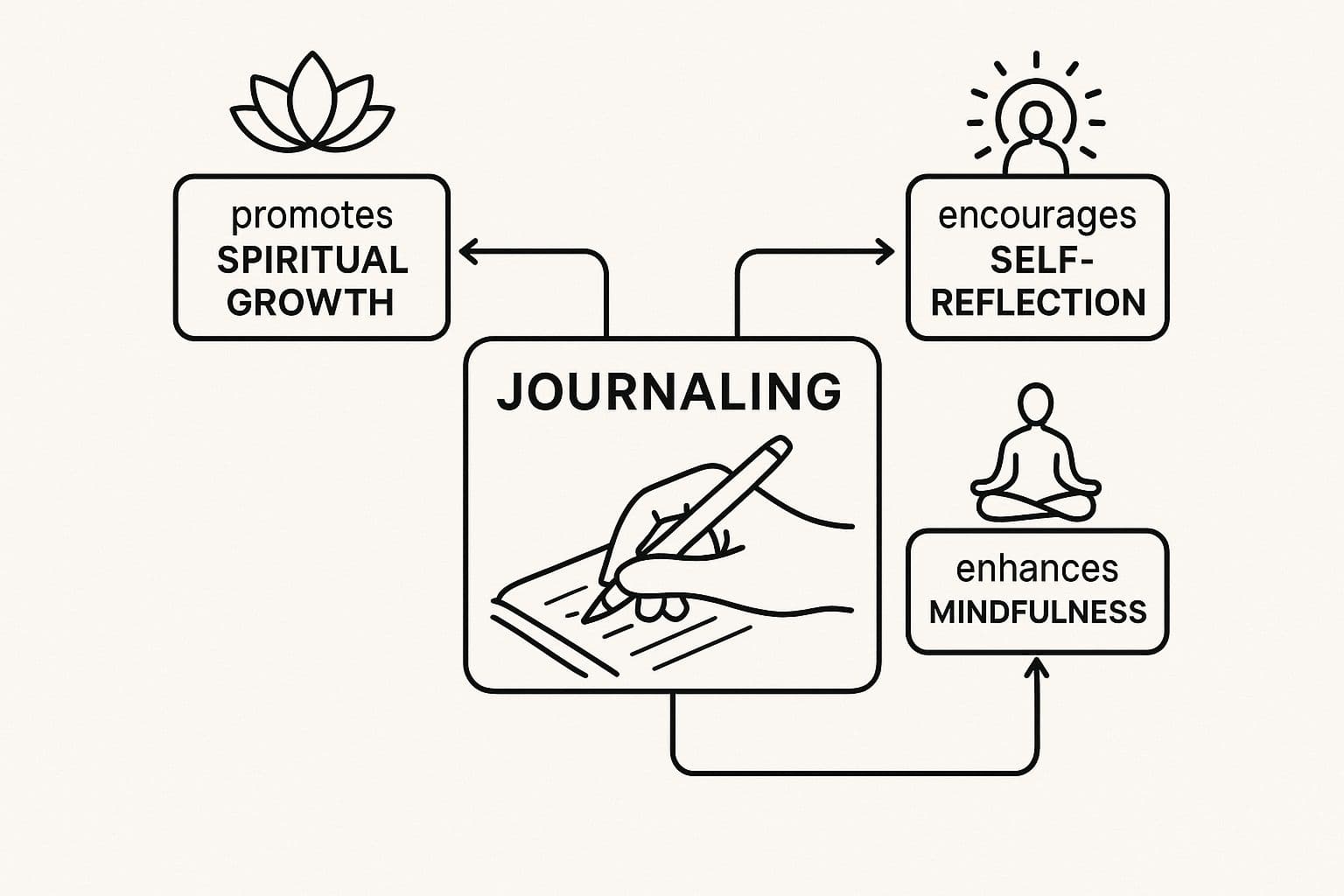What are spiritual principles? They’re simple, timeless truths that act as an inner compass to keep you grounded and intentional. These practical values aren’t religious rules; they’re daily habits that help you respond to life with more clarity, calm, and purpose. In this article you’ll learn core principles, easy practices to try each day, and how to make them part of a durable spiritual practice.
September 22, 2025 (5mo ago) — last updated January 24, 2026 (1mo ago)
Practical Spiritual Principles for a Meaningful Life
Learn practical spiritual principles—gratitude, compassion, acceptance, integrity, mindfulness—with daily practices to boost purpose, focus, and resilience.
← Back to blog
Practical Spiritual Principles for a Meaningful Life
Summary: Discover core spiritual principles—gratitude, compassion, acceptance, integrity, and mindfulness—and practical daily practices to boost purpose, focus, and resilience.
Introduction
What are spiritual principles? They’re simple, timeless truths that act as an inner compass to keep you grounded and intentional. These practical values aren’t religious rules; they’re daily habits that help you respond to life with more clarity, calm, and purpose. In this article you’ll learn core principles, easy practices to try each day, and how to make them part of a durable spiritual practice.
What Are Spiritual Principles, Really?

“Spiritual” often evokes organized religion, but spirituality reaches beyond institutions. Spiritual principles form the bedrock of your inner life. Treat them as guideposts for personal growth—values anyone can practice, regardless of background or belief. These ideas connect with universal wisdom that appears across cultures and time.
Spirituality Outside Religion
Many people describe themselves as “spiritual but not religious.” Surveys show a notable share of religiously unaffiliated people still hold spiritual beliefs1. Spiritual practice can be separate from formal religion while still offering meaning and connection.
Bringing Principles Into Daily Life
Spiritual principles become visible through small, consistent habits, rituals, or meaningful objects you keep close. They shape how you react to stress, relate to others, and make choices that reflect your deepest values. Over time, these habits turn abstract ideas into real change.
Core Spiritual Principles and How to Practice Them
| Spiritual Principle | Core Meaning | Example in Daily Life |
|---|---|---|
| Gratitude | Acknowledging and appreciating the good in your life | Start your day listing three things you’re thankful for |
| Acceptance | Seeing reality clearly, without judgment | When stuck in traffic, choose to listen to a podcast instead of getting frustrated |
| Compassion | Recognizing others’ suffering and offering care | Listen to a friend without rushing to fix their problem |
| Integrity | Acting in alignment with your values | Politely decline a request that conflicts with your principles |
| Mindfulness | Being present and attentive to the moment | Savor your morning coffee without scrolling on your phone |
This table is a starting point. The real work is discovering which principles resonate with you and weaving them into daily life.
Discovering Universal Spiritual Truths

Across cultures and centuries, similar wisdom reappears. Shared truths—like the Golden Rule—point to our common human needs for empathy, connection, and meaning.
The Golden Rule and Its Reach
The Golden Rule—treat others as you’d like to be treated—appears in many traditions because it offers a practical roadmap for empathy and social harmony. It’s more than manners; it points to our interconnectedness and shows how small actions shape communities.
Other Shared Truths
Forgiveness, gratitude, and service are recognized globally as essential ingredients of a well-lived life. Forgiveness frees you from resentment; gratitude shifts attention from scarcity to abundance. These principles reappear in ancient philosophy, indigenous traditions, and modern psychology.
Think of these principles as different languages telling the same story about peace, connection, and meaning.
Finding Your Personal Path with Numerology
Universal principles give a broad map, but your most meaningful growth is personal. One practical tool for personal insight is Dan Millman’s system in The Life You Were Born to Live and the Life Purpose App, which use your birthdate to highlight recurring lessons and strengths4.
Calculating Your Life Number
A life number—calculated from your birthdate—can point to themes and challenges that repeat in your life. It’s a simple way to make spiritual growth feel more tangible; the number acts like a headline for your personal journey and suggests which principles may matter most to you.

Examples of life-path themes:
- Creativity Path: Lessons in self-expression and moving past self-doubt. Core principles: self-expression, emotional sensitivity.
- Trust Path: Lessons in faith and cooperation. Core principles: trust, collaboration.
- Freedom Path: Lessons in discipline and responsible independence. Core principles: freedom, self-discipline.
Once you know your life number, repeating challenges stop feeling random—they become invitations to deepen the principles that matter most to you. For a step-by-step guide, see our article on how to calculate your life path number.
Living With Spiritual Principles in a Fast-Paced World
When life feels like a sprint, spiritual principles act as a reliable internal guidance system. They’re tools for staying centered, not rigid rules to follow.
For example:
- Mindfulness helps you cut through workday noise and find calm focus. Research shows mindfulness practices can reduce stress and improve attention and emotional regulation2.
- Acceptance helps you move forward after setbacks instead of staying stuck in frustration.
- Integrity builds trust and steady relationships at home and at work.
Practicing Mindfulness in Minutes
Mindfulness is simply paying attention to the present moment. Try this quick practice:
- Find a quiet corner, even in your car.
- Breathe in slowly for a count of four.
- Let thoughts pass without clinging to them.
- Return to your day with a little more clarity.
Mindfulness isn’t about escaping life; it’s about returning to it more fully.
Acceptance and Integrity
Acceptance isn’t giving up; it’s seeing what is so you can act wisely. Integrity means aligning your actions with your values, like owning a mistake instead of hiding it. Those choices earn respect and inner peace.
| Life Aspect | Approach Without Principles | Approach With Principles |
|---|---|---|
| Stress Management | Reactive and overwhelmed | Calm, centered, and proactive |
| Conflict Resolution | Avoidance, blame, or aggression | Seeks understanding and dialogue |
| Personal Reputation | Inconsistent or opportunistic | Credible, trustworthy, dependable |
When principles support each other, they create a synergy that makes life steadier and more meaningful.
“Spiritual principles are an anchor that holds steady when life’s waves get rough.”
Building Your Own Spiritual Practice
Knowing principles is one thing; living them is where transformation happens. You don’t need a complex system—consistency in small practices matters more than occasional grand gestures.
Even five minutes of quiet reflection can reset your day.
Simple Practices to Start
- Journaling: Spend a few minutes writing without judgment to untangle feelings and notice patterns. Expressive writing has measurable benefits for mental health and emotional processing3.
- Nature time: Walk, sit in a park, or simply look at the sky to remind yourself you’re part of something larger.
- Gratitude: Each night, list three specific things you’re grateful for to rewire attention toward abundance.
- Service: Do a small, kind act without expecting anything in return to shift focus toward connection.
The most effective practice is the one you actually do.
For more on getting started, see our guide on how to start a spiritual journey and the Life Purpose App mentioned earlier4.
Common Questions About Spiritual Principles
Do I have to be religious to follow spiritual principles?
No. Spiritual principles are universal values—compassion, gratitude, integrity—that stand apart from any single religion. Spirituality is a personal connection to purpose; religion is one organized way people explore that connection.
How are spiritual principles different from a moral code?
They overlap but aren’t identical. A moral code lists actions considered right or wrong by society. Spiritual principles ask you to explore your deeper motives, your why, so choices come from inner alignment rather than external rules.
Where do I start if I feel lost?
Start small. Try five minutes of mindful breathing or a nightly gratitude list. Small, regular habits build momentum. If you want a personalized starting point, tools like Dan Millman’s framework and the Life Purpose App can provide focused direction4.
Quick Q&A — Common User Questions
Q: What are spiritual principles at a glance?
A: Simple, timeless values—gratitude, compassion, acceptance, integrity, and mindfulness—that guide daily choices and provide inner stability.
Q: How can I practice them daily?
A: Use short, repeatable actions: three gratitudes each morning, a minute of mindful breathing, journaling, or small acts of service.
Q: Will my principles change over time?
A: Yes. Spiritual growth evolves with life stages; the principles you prioritize at one age may shift as you gain experience and perspective.
Three Concise Q&A for Quick Guidance
Q: I’m short on time—what’s one simple practice?
A: Do one minute of mindful breathing—inhale four counts, exhale four counts—to reset stress and sharpen focus.
Q: How do I choose which principle to focus on?
A: Notice recurring challenges. If you react with anger, focus on acceptance and mindfulness. If you avoid hard conversations, focus on integrity and compassion.
Q: How will I know progress is happening?
A: Look for small shifts: fewer reactive moments, clearer priorities, deeper connections. Progress often shows as steadier daily choices.
Discover Your Life Purpose Today!
Unlock your true potential and find your life’s purpose.
